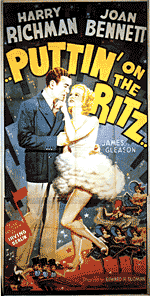This article needs additional citations for verification .(May 2019) |
| Puttin' On the Ritz | |
|---|---|
 Poster for the 1940s re-release | |
| Directed by | Edward Sloman |
| Written by |
|
| Produced by | |
| Starring |
|
| Cinematography | Ray June |
| Edited by | |
| Music by | |
| Distributed by | United Artists |
Release date |
|
Running time | 88 minutes |
| Country | United States |
| Language | English |
Puttin' On the Ritz is a 1930 American pre-Code musical film directed by Edward Sloman and starring Harry Richman, Joan Bennett, and James Gleason. The screenplay was written by Gleason and William K. Wells based on a story by John W. Considine Jr. It was the first of many films to feature the popular song "Puttin' On the Ritz", which was written and published by Irving Berlin in 1929.
